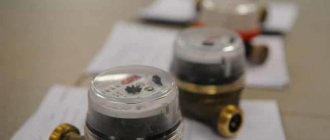Why rusty water flows from the tap - the main reasons
Some of the main causes of rusty tap water include:
- High level of wear and tear on communications responsible for water supply to consumers.
- Supplying water with sediment, which, when accumulated, leads to the appearance of rust in the water.
- Poor water purification. Since the water contains a significant amount of metal particles, it must be thoroughly purified before being supplied to end consumers.
- Planned outages. Utility workers check each house before the beginning and at the end of the heating season for wear and tear of utility lines, and carry out the necessary repairs. After this, rusty water may appear in the taps, but this problem disappears quite quickly.
After turning off the water there is rusty water - why
Many of our readers are concerned about the question: why does rusty water flow after the water is turned off? It is worth noting that this phenomenon is recognized as the norm at the legislative level , however, provided that during this period, utilities carry out routine inspections of pipelines.
Since most pipes are made of metal, rust forms on the surface due to oxidation processes. When the pipe is completely filled with water, oxidation occurs much more slowly. As soon as the water supply is turned off, the process accelerates sharply, and within a short period of time a rust coating forms on the inner surface of the pipe. After turning on the pressure, it is washed off, and therefore within the first minutes after turning on the water, we have the opportunity to observe rust.
Legal requirements
Requirements and standards that relate to water supply in residential buildings are outlined in the following legislative acts:
- Government Decree No. 354 of May 2011, which contains all the criteria and requirements for the quality of public services.
- Sanitary standards for hot water supply in residential buildings dated April 2009 No. 20.
Based on these official legislative acts, we can conclude that:
- the temperature range of hot water supply should be in the range from 60 to 75 degrees, regardless of the type of heating system;
- Before measuring the water temperature, you must drain it for three minutes.
According to the law, a slight discrepancy between the indicated values is allowed. At night, in particular from 0.00 to 5.00 by no more than 5 degrees, in the daytime, from 5.00 to 0.00 by no more than three degrees.
The legislation also states that the supply of cold water instead of hot water, or a temperature discrepancy greater than the number of degrees allowed by law must be reflected in the fat.
ATTENTION! Accordingly, the management organization is obliged to recalculate in this situation. When recalculating, it is necessary to take into account that all hours during which water below forty degrees enters the home instead of hot water are added up.
The resulting time is charged as for cold water. If the water temperature is below 60 degrees, but above 40, then the payment for hot water supply is simply reduced. If the deviation from the norm is more than three degrees, the fee is reduced by 0.1% for each hour of discrepancy.
Is it possible to wash in rusty water?
Consumers are interested in the question of whether it is possible to wash in rusty water . As numerous data from analysts show, rust is always present in water. If the concentration is no more than 0.3 mg per 1 liter of liquid, it is impossible to see rust. Such water is quite suitable for consumption, and you can also wash with it. However, experts recommend that when drinking such water, boil it first.
If the rust concentration is in the range of 0.4-0.8 mg, the water cannot be used as drinking water, but it is still suitable for washing dishes.
If the rust in the water is pronounced, and the water itself is yellow or orange, then washing with it is strictly contraindicated.
It is also worth remembering that rusty water can seriously damage household appliances such as washing machines, dishwashers and kettles. Therefore, you should ensure that dirty water comes into contact with household appliances as little as possible.
How to clean
The only option for purifying rusty water is to install special filter elements. The filter will trap rust particles, thereby allowing the consumer to enjoy clean water. However, do not forget that filters also require maintenance and must be changed or cleaned at regular intervals. Otherwise, harmful microorganisms may arise that negatively affect human health.
When talking about how to clean rusty water, do not forget about settling.
To do this, you need to pour it into a container and leave it for a while. After a few hours, a layer of rust forms at the bottom of the container. The water can be carefully drained, being careful not to stir up the cloudy sediment, and it can later be used for washing dishes, but under no circumstances for drinking.
Why does this happen?
There are several possible reasons:
- Strong temporary contribution of pipes responsible for water supply. Unfortunately, not all regions and cities are equally provided with the new pipeline system. Many are forced to be content with what was established a long time ago
- Sediment that accumulates in water and causes rust to accumulate. Also, foreign impurities, soil and debris entering the pipeline can change color.
- Low quality of cleaning. Before the water flow reaches people, it undergoes preliminary purification to remove metal particles. If this does not happen, then the person receives low-quality water with an orange tint.
- Planned repair or maintenance work, emergency situation. Utility workers should check pipes for wear every year. If they determine the need to replace them, the water supply will be temporarily closed. After such manipulations, due to stagnation, a small amount of rust may accumulate, which will appear during the first time after startup.
- Improper storage of pipes before installation.
The reasons listed above are typical for residential buildings located within the city. In summer cottages or country cottages, water is taken from a well or borehole, or more precisely, from underground aquifers and rivers. These natural sources may contain large amounts of impurities. This is due to natural processes occurring in the soil and harmful emissions from various enterprises.
Where does it come from?
It is important to remember that to understand why brown water comes out of the tap and where to turn can only be a specialist who will conduct a thorough diagnosis and send a water sample for a more detailed study of its composition in the laboratory. Don't immediately blame the city water supply system or think about the accumulation of a large amount of rust in the pipe clearance. There is a high probability that the problem is the direct water source, where water resources come from to meet people's needs. Most often, they contain a lot of ferrous iron, which is oxidized as the water moves to the tap. But it is not necessary to exclude the presence in the system of various bacterial microorganisms that contribute to the oxidation of Fe to oxides of the highest valence.
Is it possible to drink rusty water?
Based on SanPin 2.1.4.1074-01.2.1.4, the quality of water and the permissible amount of iron in it is a maximum of 0.3 mg/l. The human eye does not detect this 0.3 mg, so water appears colorless and transparent to us, which is why it is safely used for culinary purposes, washing dishes and drinking (preferably after boiling first). If this indicator increases, its use is prohibited. If a slight excess is observed (from 0.4 to 0.8 mg/l), then the color of the water acquires a yellow tint. This quality is sufficient for washing dishes, but subject to preliminary settling as follows: filling a free container (preferably made of glass, so the sediment will be visible), settling for 3 hours and pouring into another container (without shaking).
If the color has changed to orange or brown, then using it for any purpose will be hazardous to health and can also cause significant damage to household appliances. Boiling, settling and other purification methods will be ineffective, so it is better to stop using such water. Ignoring these safety rules is fraught with the risk of developing a heart attack, damage to the liver, kidneys, gastrointestinal tract, decreased immune defense, and headaches. There is also a threat of tissue degeneration, that is, cancer.
MBFT-75 Membrane for 75GPD
AMETHYST - 02 M Residential building for up to 10 people or up to 2 cubic meters/day.
Aeration unit AS-1054 VO-90
Is it possible to swim, wash or wash your hair?
It is strongly recommended to refrain from using contaminated water flow for any hygiene procedures. Bathing, washing your hair or brushing your teeth in such conditions is fraught with skin pigmentation, hair loss, brittle nail plate and deterioration of tooth enamel. This is not a complete list of problems that a person who ignores safety rules may encounter.
The presence of rust is a threat not only to life, but also to kitchen equipment, which is likely to break or become completely unusable. Significant blockages form in toilet tanks. Hoses and pumps of washing machines and shower cabins are also damaged. If washed in such conditions, the clothes may be damaged, as they will change their color to a rusty shade and it will not be possible to restore the laundry even if strong chemicals are used.
What SanPiN says
The legislation of the country has developed some rules and restrictions in the field of compliance with sanitary rules. Their implementation is carefully monitored by the authorities and authorized persons, who are obliged to promptly identify violations and take measures to eliminate them. Taking into account the established rules, the maximum level of iron in drinking water is 0.3 mg per 1 liter. At the same time, it is not possible to say that these restrictions are met, because only after this indicator of 1 mg per liter is exceeded does a yellowish tint appear, and an orange color appears as much as 10 mg/l. But based on this information, you can roughly imagine how effectively the deferrization station and cleaning system operate.
When is it time to complain
Every consumer must know where to complain about rusty water. In accordance with the current legislation, even the irregular appearance of rusty water is a violation of consumer rights. The fact is that each user pays monthly for the water used, and in the case of rust, he drains it, thereby losing his money.
The exception is when a routine inspection of water supply lines is performed. After repairing and replacing damaged areas, rust residues enter the water and can reach the end user. In accordance with the approved rules, this reason is the only one when a small amount of rusty water in taps is allowed. If the appearance of rust in water is not associated with scheduled work, then a complaint should be filed.
The temperature of the water may also be a reason for complaint! How to protect your rights in this case? We wrote about this here: the standard temperature of hot water in the tap in an apartment and SanPin. ⇐
Sample statement (complaint) if cold water flows from the tap instead of hot
___________________________________________ (name of body, full name of the head) From _________________________________________ Tel.________________________________________ E-mail _____________________________________
Application for an administrative offense under Article 7.23 of the Code of Administrative Offenses “Violation of standards for providing the population with utility services”
At the address ___________, the management organization violates the norms of the Housing Code of the Russian Federation and the Rules for the provision of utility services, namely in the apartment: low hot water temperature.
In accordance with the Rules for the provision of utility services to owners and users of premises in apartment buildings and residential buildings, approved by Decree of the Government of the Russian Federation No. 354 of May 6, 2011. and sanitary rules and regulations of Russian legislation (SanPin 2.1.4.2496-09), the hot water temperature should be no lower than 60°C and no higher than 75°C.
In accordance with paragraph 31 of the Rules for the provision of utility services to owners and users of premises in apartment buildings and residential buildings adopted by Decree of the Government of the Russian Federation of May 6, 2011 N 354, an organization providing utility services to the consumer is obliged, independently or with the involvement of other persons, to carry out maintenance of intra-house engineering systems with the use of which utility services are provided to the consumer, as well as recalculate the amount of payment for utility services, including in connection with the provision of utility services of inadequate quality and (or) with interruptions exceeding the permissible duration.
In accordance with Article 154 of the Housing Code of the Russian Federation, payment for residential premises includes payment for the maintenance and current repairs of common property in an apartment building, as well as payment for utilities.
In this regard, the implementation of work to eliminate this violation does not require additional financing from the owner.
Article 2 of the “Regulations on State Housing Supervision”, approved by Decree of the Government of the Russian Federation No. 493 of June 11, 2013, states: “The tasks of state housing supervision are to prevent, identify and suppress violations by government bodies, local governments, as well as legal entities, individual entrepreneurs and citizens established in accordance with housing legislation, legislation on energy saving and on increasing energy efficiency requirements for the use and safety of the housing stock, regardless of its form of ownership, including requirements for residential premises, their use and maintenance, use and maintenance of the common property of premises owners in apartment buildings, the formation of capital repair funds, the creation and operation of legal entities, individual entrepreneurs managing apartment buildings, providing services and (or) performing work on the maintenance and repair of common property in apartment buildings, providing utilities to owners and users of premises in apartment buildings and residential buildings, specialized non-profit organizations that carry out activities aimed at ensuring the overhaul of common property in apartment buildings, as well as the requirements for energy efficiency and equipping the premises of apartment buildings and residential buildings with metering devices for the energy resources used.”
In addition, in accordance with Article 28.4 of the Code of Administrative Offenses of the Russian Federation, the Prosecutor's Office has the right to initiate proceedings for any administrative offense.
Clause 149 of the Rules establishes that the contractor, the organization providing utility services, bears responsibility for violations of the quality of provision of utility services to the consumer, including administrative responsibility.
Violation by persons responsible for the provision of utility services of the standards for providing the population with utility services constitutes an administrative offense, liability for which is provided for in Article 7.23 of the Code of Administrative Offenses of the Russian Federation.
In connection with the above, on the basis of the Decree of the Government of the Russian Federation of September 26, 1994 No. 1086 “On the State Housing Inspectorate in the Russian Federation”, the Federal Law “On the Prosecutor’s Office of the Russian Federation”, the Federal Law “On the procedure for considering appeals from citizens of the Russian Federation”, I ask:
— organize an on-site verification of the stated facts;
— issue an order to carry out the necessary measures and work to eliminate the violation and carry out recalculation, set deadlines for their implementation;
— initiate administrative proceedings under Article 7.23 of the Code of Administrative Offenses of the Russian Federation, identify the perpetrators and bring them to administrative responsibility.
(date) (signature)
You can file complaints about the inaction of your housing office, management company and homeowners association in the field of housing and communal services to the prosecutor's office or Rospotrebnadzor in your region.
Where to complain?
If the appearance of rusty water is irregular and occurs in isolated cases, then you should file a complaint with the management company. A similar action should be taken if, after replacing pipes or cleaning the boiler, the quality of the supplied water has noticeably deteriorated.
If the management company ignores citizens’ complaints, or the problem continues for a long period of time, then filing a complaint with the resource-supplying structure (in this case, the water utility) will be more effective. In such a situation, the necessary analyzes of drinking water will be carried out and the causes of contamination will be determined.
If the water utility cannot help in any way, then it is worth writing complaints to Rospotrebnadzor and law enforcement agencies. However, as practice shows, most often the water utility and the management company try to prevent such a development of events, and therefore promptly respond to citizens’ requests.
Complaint about rust from faucet
Failure to comply with water resource quality requirements, untimely repairs and replacement of communications are grounds for complaints.
Causes
The basis for the complaint is the supply to the population of a low-quality resource, contaminated with foreign impurities (rust) as a result of the unsatisfactory condition of the water supply system.
Attention! The consumer must first document the inadequate quality. For this purpose, representatives of the management organization are invited, who draw up the corresponding act. You can submit samples for testing to Rospotrebnadzor. You also need to take a photo or video of the presentation of a low-quality resource.
Rice. 3. The water filter is what sometimes flows from the tap.
Complaint structure
Table 2. Contents of the appeal
| Point of claim | The essence is brief |
| Recipient | Institution where the complaint is sent (name and address) |
| Applicant (representative) | Personal details, address and telephone number, if available - email |
| Name | Complaint (claim, statement) |
| The essence | Briefly describe the problem and consequences |
| Applicant's claim | About bringing the resource to acceptable indicators |
| Application | Evidence (for example, act, conclusion, photographs, video) |
| Date and signature | Complete the document |
Attention! To speed up the resolution of the problem, it is recommended to file a collective complaint (for example, by residents of the entrance or house).
You can prepare your own appeal using the following sample.
Institutions for complaint
You must submit your claim to:
- management organization, resource provider (immediately after the problem occurs);
- local administration;
- Housing inspection;
- Rospotrebnadzor;
- prosecutor's office (when the applicant's problem is ignored).
If poor quality causes damage to property (for example, a washing machine breaks down) or harm to health (for example, a person is poisoned), the consumer has the right to demand compensation in court. It is worth turning there when all other authorities are powerless to solve the problem. For example, if the cause of rust is the unsatisfactory condition of the water supply system, the court may oblige the defendant to replace communications (carry out repairs).
This is interesting! What will happen if you ignore utility bills?
Submission methods
There are three options to complain:
- orally - for example, by calling the hotline number of the territorial department of Rospotrebnadzor or the dispatcher of the management organization;
- in writing - by sending a complaint or leaving it in the office;
- online – by selecting the appropriate department on the Internet.
In the latter case, you can leave a claim on the websites of departments or special services for complaints about housing and communal services.
Attention! In the event that rust flows from the tap, the consumer has the right to recalculate the payment for housing and communal services. If you refuse to do it, you must complain to the Housing Inspectorate and (or) the prosecutor's office.
Through the Internet
The first way to complain online is the State Services portal. This method is available to registered users. You must select “GIS Housing and Communal Services” at the bottom of the main page. Then, in the “Electronic Services” section, click on “Write a request”.

Rice. 4. Complaint through State Services
After the system prompts, log into your personal account and select “Submit an appeal or complaint.” Fill in the blanks and attach an additional file (up to 50 megabytes). Save and send the request.
You can also complain on the RosZhKH portal or the websites of the prosecutor's office, Housing Inspectorate or Rospotrebnadzor.
Proof
It is quite natural that in addition to the complaint, the consumer must provide evidence of the violation. First of all, this is photographic and video material that shows that dirty or rusty water is flowing from the tap, and evidence that there is a bad smell.
If, at the user’s request, any research or analysis on water quality was carried out, then their results should also be attached to the application.
In addition, as evidence, the user can attach to the complaint an agreement with the management company and a utility payment for water.
What to do
First of all, you need to measure the water temperature. Make sure that it really does not meet the requirements stated by law. After the measurement has shown a decrease in temperature below the required minimum, it is necessary to perform a certain algorithm of actions:
- Notify the management organization about the drop in hot water temperature.
- It is necessary to leave a request for an employee of the organization to visit the apartment for the purpose of taking measurements.
- Based on the results of measurements, a report is drawn up in two copies. One remains with the employee, the second is given to the owner of the apartment.
- If utility service employees detect a drop in temperature and document this fact in the report, from the moment it is drawn up, a reduction in cost for this type of service applies.
- The owner pays for hot water supply at a reduced rate until the cause of the violation is eliminated. Based on the results of repair and restoration work, a new act is drawn up. It indicates the reason, a list of measures taken, and the results of repeated measurements.
- If your request to the utility service goes unnoticed, contact the housing inspector.
- Representatives of this inspection know how to hold public utilities accountable. For failure to fulfill its direct responsibilities, the organization is subject to penalties. In addition, a statement of claim may be filed in court, deprivation of a license, etc.
- If representatives of utility services do not respond, and the hot water is barely warm, where can you complain? In this case, residents can go directly to the court or prosecutor's office. In such disputes, the court usually makes a decision in favor of the plaintiff.
In this case, the applicant has every right to recover from the management organization not only the money paid for hot water, but also for moral damage.
When going to court, the plaintiff must understand that it is unlikely that it will be possible to quickly solve the problem in this way . In addition, a convincing evidence base will be required that will leave no doubt that the apartment owner is right.
How to make a complaint, what needs to be indicated, sample
When filing a complaint (see the link for an example), you should remember some important points regarding its registration:
- There is no single sample complaint, so you can write it in any form.
- It is necessary to indicate in the text of the complaint the reason why the user decided to file a complaint.
- You should also indicate the facts of supplying low-quality water (except for cases when scheduled work is carried out on water pipelines). Additionally, you can specify other reasons. So, if the tap remains cold, although hot water should be flowing, this is also a violation.
- The user has the right to demand compensation in the form of compensation for moral damages and the cost of damaged property (damaged filters, a broken dishwasher, washing machine, etc.), a refund of the money spent on the purchase of bottled water. In addition, since the service is of inadequate quality, the consumer may be exempt from paying for water.
You can view a sample complaint about poor water quality here. ⇐
How to solve the problem with hot water yourself?
Dealing with utility companies requires a lot of time and nerves. Many people solve the unpleasant situation with hot water supply on their own.
Installing a thermal meter will help in the fight against unfair charges for cold water supply through a hot riser. Such a device takes into account the consumption of hot water that only complies with the standard. If the temperature is too low, the water flow from the hot riser is equal to the cold water flow. Thus, the thermal meter allows you to pay only for normal services.
However, there are a number of difficulties with such a counter.
- Recalculation of readings based on the operation of the temperature sensor is not provided for by law.
- Utilities may not agree with the installation of a meter with a temperature sensor.
- Accounting for the consumption of hot water as cold water may fall on the shoulders of all residents by paying for general household needs.
- This wonderful device will not eliminate problems with hot water supply.
The last consideration poses the need to install a boiler (water heater). With reasonable water consumption, the price for heating a boiler does not differ from the price for hot water supply.
When installing a boiler, if there is no hot water meter, the hot riser tap must be officially sealed. If you have a meter, simply turn off the water along the hot riser.
What to do next if there is no adequate response to the complaint
If no action is taken, and rusty water continues to flow from the tap, then you should submit written statements to several higher authorities, including the prosecutor's office, district court, Rospotrebnadzor and the State Housing Inspectorate.
However, it is worth noting that a complaint can be filed with these structures only if there is an appropriate evidence base. In particular, if any research from independent experts has been carried out, their results should be attached to the application.
What to do if the management company does not respond to residents’ complaints?
If the HOA or management company does not respond to complaints, then it is worth filing a claim in court. At the same time, it is worth suspending payments for water, since poorly provided services should not be paid for out of the consumer’s pocket.
Important! The provision of utility services is regulated by the Law “On the Protection of Consumer Rights” N 2300-1.
In most cases, the court satisfies the tenants' claims and the management company is forced to recalculate. If the claim is not satisfied, then it is possible to file a cassation appeal to review the case. Apartment owners must defend their rights to receive quality service for their money.
We can help you file a claim in court , contact our lawyers in the online consultant window (at the bottom right of the screen), if all our lawyers are busy, you will be asked to write your question in order to pass it directly to a lawyer specializing in this area of law and indicate your contact phone number , our lawyer will call you back and advise you completely free of charge. Or just call us at 8(800)-350-30-02 (the call is free for all regions of Russia).










